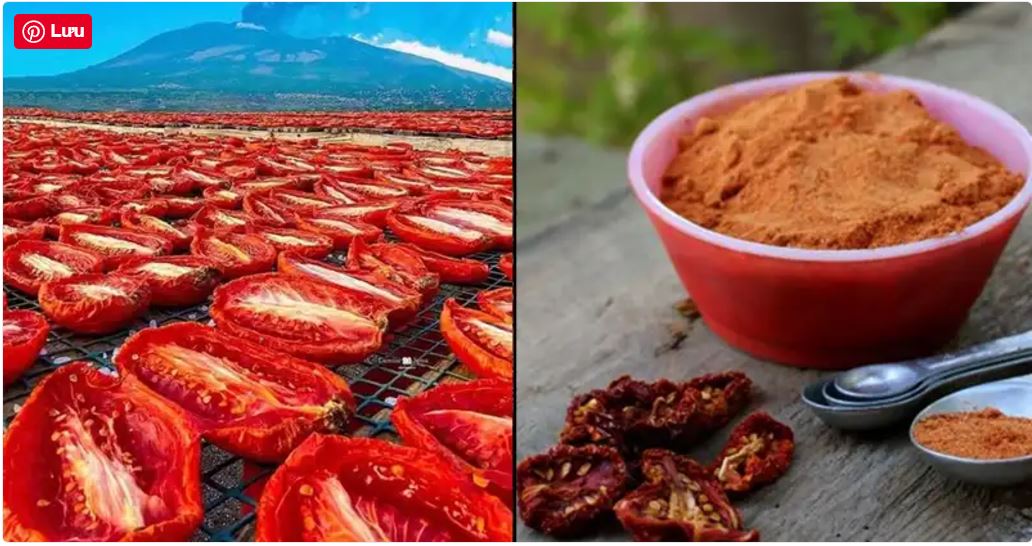
Tomatoes are a kitchen staple, but the excess supply can sometimes pose a challenge for both farmers and consumers. The surplus often results in significant post-harvest losses, leaving farmers with a conundrum and consumers missing out on their favorite tomato dishes. However, there’s a solution that can benefit both parties: transforming excess tomatoes into versatile tomato powder. In this article, we will explore why making tomato powder is a sustainable solution and how to creatively use this ingredient in your culinary endeavors.
The Problem: Tomato Surpluses and Post-Harvest Losses
Farmers often find themselves grappling with an oversupply of tomatoes, leading to substantial post-harvest losses. This surplus results in a significant portion of the fruit going to waste in fields or markets. The root of the problem lies in the limited knowledge regarding tomato preservation and value addition.
The consequences are clear: farmers lose more than half of their total tomato production, which affects their livelihoods and disrupts the global food supply chain. Addressing this issue is pivotal for the sustainable and efficient utilization of resources.
The Solution: Transforming Tomatoes into Powder
One innovative solution to this problem is the transformation of surplus tomatoes into tomato powder. This process not only helps prevent wastage but also adds value to the produce. Here’s how you can make tomato powder:
Step 1: Select the Best Tomatoes
Start with ripe, high-quality tomatoes. While you can use any variety, Roma tomatoes are often preferred due to their meatiness and lower water content.
Step 2: Wash and Slice the Tomatoes
Thoroughly wash the tomatoes, remove any stems, and slice them into thin, uniform pieces. This will help speed up the drying process.
Step 3: Dehydrate the Slices
You can use a food dehydrator, an oven, or even the sun to dry the tomato slices. The key is to remove as much moisture as possible. The lower the moisture content, the longer the powder will last in storage.
Step 4: Grind into Powder
Once the tomato slices are completely dehydrated, use a grinder or blender to pulverize them into a fine powder. You now have your homemade tomato powder.
How to Use Tomato Powder
Tomato powder is a versatile ingredient that can elevate your culinary creations. Here are some practical ways to incorporate it into your cooking:
-
Sauces and Soups: To make a quick tomato sauce or soup, simply mix tomato powder with hot water to achieve the desired consistency and flavor.
Seasoning and Rubs: Add tomato powder to spice blends and rubs for meats, poultry, and vegetables. It imparts a rich tomato flavor that enhances your dishes.
Baking: Enhance the flavor of bread, rolls, and pastries by adding tomato powder to the dough or batter.
Salad Dressings: Create a unique twist on salad dressings by including a pinch of tomato powder for an extra layer of flavor.
Instant Tomato Soup: For a speedy and flavorful tomato soup, rehydrate tomato powder with hot water. It’s perfect for a quick meal.
Dips and Spreads: Mix tomato powder with dairy or plant-based alternatives to create delicious and unique dips and spreads.
Marinades: Combine tomato powder with other spices to craft flavorful marinades for meats, tofu, or vegetables.
Snacks: Sprinkle tomato powder on popcorn, chips, or roasted nuts to make savory snacks.
Conclusion
By transforming excess tomatoes into tomato powder, we can address the issue of tomato surplus, reduce post-harvest losses, minimize food waste, and enjoy the rich taste of tomatoes year-round. With a shelf life of more than a year, tomato powder is a valuable addition to your pantry. So, the next time you find yourself with surplus tomatoes, consider making tomato powder and unlock a world of culinary possibilities.
News
JJ Redick reacts to Luka Doncic trade for Anthony Davis
In one of the most jaw-dropping moves of the season, the NBA landscape was rocked by the blockbuster trade involving Luka Dončić and Anthony Davis—a swap that has sent ripples of excitement, disbelief, and heated discussion through the league. Among…
Anthony Davis FULL reaction to trade to Mavericks for Luka Doncic
In a blockbuster move that sent shockwaves through the NBA and left fans reeling, Anthony Davis has been traded to the Dallas Mavericks in exchange for Luka Dončić. In the immediate aftermath of the news, Davis took to the media…
Shaq reacts to Dallas Mavericks wanting Kevin Durant after Luka-AD trade 👀
In the constantly shifting world of the NBA, trade rumors and blockbuster moves are a regular part of the season’s drama. The latest twist has fans buzzing: the Dallas Mavericks have reportedly set their sights on acquiring Kevin Durant in…
Donovan Mitchell FILTHY poster dunk on Kristaps Porzingis 😳
In a game filled with high-intensity moments and jaw-dropping highlights, one play in particular has left fans and analysts buzzing about Donovan Mitchell’s latest display of athleticism. Early in the contest, with the atmosphere already charged by an evenly matched…
Joel Embiid hits go-ahead bucket vs Mavs then chats with Anthony Davis after game
In one of the most thrilling contests of the season, Joel Embiid delivered a clutch performance against the Dallas Mavericks, punctuating the game with a go-ahead bucket that sent the home crowd into a frenzy. The atmosphere in the arena…
D’Angelo Russell game winner as Nets hit two 3’s in 3 seconds to win vs Rockets 😱
In one of the most electrifying moments in recent NBA history, D’Angelo Russell delivered an unforgettable game-winner that left fans and commentators in complete awe. With the Brooklyn Nets locked in a tense battle against the Houston Rockets, the outcome…
End of content
No more pages to load











